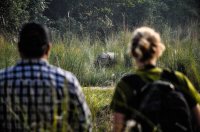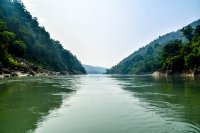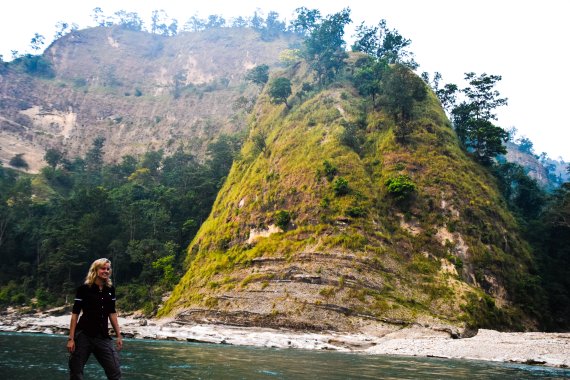‘I’ve actually always been really wary. If someone comes to help me, I usually assume they want money. So when someone came up to me at the airport in Kathmandu, the capital of Nepal, and wanted to help me find the bus, I assumed he too wanted to rip me off. I clearly looked like a tourist. But this man looked at my ticket, brought me to the bus and said: “In you get. Bye!” I did eventually get used to how helpful the Nepalese are.

Predictions
I was based in the Bardia National Park along with a fellow student. They are planning to merge a glacier river with a rainwater river there in three years’ time so as to free up more farmland. For my research, I studied the aquatic insects in those rivers. I wanted to know whether there were certain indicator species that respond specifically to temperature, for instance. I wanted to use those species to predict the effect that combining a cold-water river with a warm-water one would have on the ecosystem.
We often took a raft down the two rivers to collect samples. Then, back in the laboratory, I would identify the insects we had found.
We were the first students to work in this nature reserve and we were given total freedom to set up our own study. We were also the first to look at insects, rather than the standard choice: tigers. Now there are other students who are continuing our research. We hope that the rivers will be monitored for at least one year.

A lot of public holidays
The Nepalese are really brought up to love nature. If an elephant were to terrorize a village, the Nepalese would do nothing to stop it. Killing an elephant or a tiger is just as bad as killing a human out there.
Another thing that struck me was that the Nepalese have an awful lot of public holidays. For example, there was a huge annual holiday week, Tihar, in which sisters place a spot, a tika, on the forehead of their brothers. According to the Nepalese, the tika means you have a blood-tie with someone. You could also give the tika to a really good friend. The family we were staying with asked whether we would give a tika to their son. That was really lovely; we truly became part of the family at that point.’

